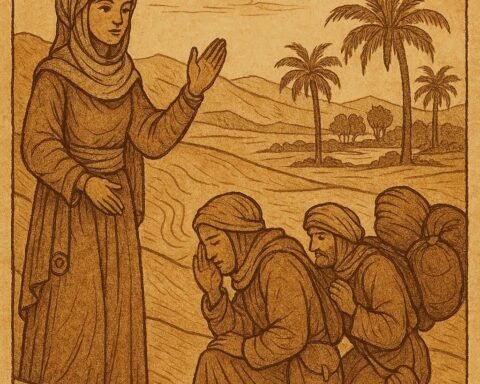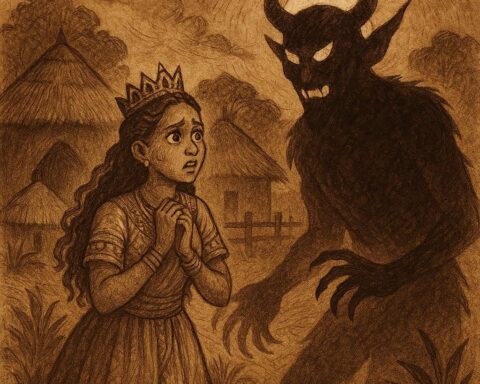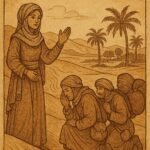Long ago, in the first days of the world, when people were still learning how to live upon the earth, there were two men. They were unlike in their ways, yet bound together by need. One of them was blind, unable to see the light of the sun or the shadows of the moon. The other was a hunter, strong and restless, who wandered far in search of food.
The hunter spent his days roaming the wild plains, bow in hand, ears sharpened to every sound. His life was filled with the chase: the rustle of grass that betrayed an animal’s movement, the swift running of antelope, the steady pull of a bowstring, and the smell of fresh meat. He lived from one hunt to another, never pausing, never storing, always moving.
The blind man, though sightless, had wisdom in his other senses. He could feel with his hands and smell with his nose what others often missed. Together the two made a strange pair, one running after game, the other left behind, yet each in his way dependent on the other.
One day, while hunting, the sighted man stumbled upon something unusual. There was a hole in the earth, hidden among bushes, from which animals came forth. When the hunter looked closer, he saw young creatures stepping timidly into the light. Believing them to be wild game, he struck them down with his weapons.
Carrying the slain animals back, he laid them before his blind companion. The blind man touched them with careful fingers, then lifted his face to smell. He shook his head slowly.
“These are not game,” he said with certainty. “These are calves. They are the young of cattle, not wild beasts.”
At that time, the hunter did not believe him. To the sighted man, meat was meat, whether it ran in the forest or walked from a hole in the earth. Yet soon, fate changed. The blind man’s eyes were healed, and his sight returned. With his new vision, he went back to that hole with the hunter. This time, he saw clearly. From the earth stepped not wild game, but cows with their calves, gentle and rich in value.
Immediately the once-blind man acted. He cut thorny branches and built a strong kraal, a fence where the cattle could be kept. He anointed his body with fat and clay, in the manner that Hottentots long practiced. He was no longer a wanderer; he was now a keeper of cattle, settled and prepared for life.
When the hunter returned and saw this, his heart burned with longing. The cattle were many, and the kraal was strong. He too desired to anoint himself, to take part in this new way of life that promised rest and plenty.
But the other man, now wise in sight and possession, said slyly, “If you wish to anoint yourself, you must first throw the ointment into the fire. Afterward, take it from the flames and use it.”
The hunter, trusting these words, followed the advice. He cast the ointment into the fire. The flames leapt high, bright and fierce, and as he reached in, the fire flared against his face, burning him terribly. His skin seared, his eyes smarted, and with a cry of pain, he fled.
From within his kraal, the cattle keeper called after him, “Here, take the kirri, the knobbed stick, and run to the hills! There you will hunt for honey and whatever else you may find.”
And so it was. The once-blind man became the father of the Hottentots, the keepers of cattle, living in kraals, herding, and anointing themselves in the old way. The other, burned and driven to the wild hills, became the father of the Bushmen, who hunted endlessly, roaming far and wide, always seeking food, always on the move.
Moral Lesson
The tale of Origin of the Difference in Modes of Life Between Hottentots and Bushmen teaches how choices and actions shape destiny. The once-blind man, careful and observant, became a keeper of wealth and stability. The hunter, careless in trusting advice, was burned and cast into a life of wandering. The story reminds us that wisdom, patience, and foresight often lead to stability, while haste and blind trust can lead to hardship.
Knowledge Check: Origin of the Difference in Modes of Life Between Hottentots and Bushmen
Who were the two men at the beginning of the story?
One was blind but wise in touch and smell, and the other was a hunter always searching for food.What did the hunter first find coming from the hole in the earth?
He found young animals, thinking they were wild game, but they were calves.How did the blind man realize the animals were cattle?
By touching and smelling them, he knew they were not wild game but calves.What change happened to the blind man before he built the kraal?
His sight was restored, and he saw the cows and calves clearly.Why did the hunter burn himself when he tried to anoint his body?
He was told to throw the ointment into the fire first, and when he followed this advice, the flames burned him.What difference in lifestyle does the story explain?
It explains why the Hottentots became herders and settled people, while the Bushmen became wandering hunters.
Source: Southern African folktale (Khoikhoi and San tradition)






